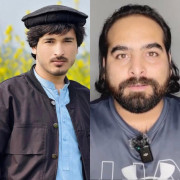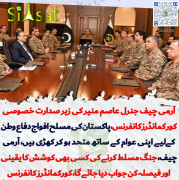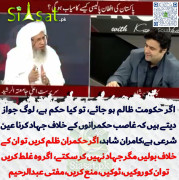moazzamniaz
Chief Minister (5k+ posts)
Police wonder which militant groups are kosher
By Salman Siddiqui
Published: June 20, 2011

Despite numerous attacks, Pakistan lacks a national policy on how to deal with terrorism. DESIGN: JAMAL KHURSHID
KARACHI: There is massive confusion in the police department about whether they can take action against certain banned groups such as the active Jamaatud Dawa unless they get the go-ahead from big brother.
These groups differ from clearly marked ones such as the Lashkar-e-Jhangvi or Tehreek-i-Taliban, who are fair game. In any given month, the police arrest at least a dozen of their operatives, who are paraded in front of the media, albeit under blankets to protect their identity. The proud officers rachet up the number of suspects and everyone goes home happy.
But what about the groups that fall in a grey area? In background interviews, senior police and civilian intelligence officials reveal to The Express Tribune that the confusion begins when they come across suspects who operate under groups with an untouchable status.
Take, for example, certain outfits such as the Jamaatud Dawa (JuD) whose members were sashaying around [Dhandanatay huey phir rahey they] in a massive rally to openly mourn the death of Osama bin Laden, as one senior police official put it. It was ironic that the force had to offer them protection for their rally, he remarked. They even openly offered funeral prayers in absentia for the al Qaeda leader.
Today, if [Sipah-e-Sahaba Pakistans general secretary] Maulana Aurangzeb Farooqi comes to the city and holds a rally, nobody in the police force would know whether he should be allowed to make a speech or not, said this officer, who has vast experience and specialises in terrorism cases. To make matters worse, the police have the complaint that the intelligence agencies are usually arrogant about these matters and tell the police force that they should be consulted first before any action is taken.
Without a doubt, theres massive confusion in the police force today about what to do with certain people belonging to some banned militant groups, said a senior civilian intelligence official, who corroborated the police officials claim. He stressed there was a dire need to set up a platform where police, civil and military security agencies can coordinate and work out what is kosher.
This confusion and its fallout has been noted and discussed not just inside the force, but by observers too. It should hardly come as a surprise that the police in Karachi, as those elsewhere in the country, dont know what to do, said Zahid Hussain, who is the new Pakistan scholar at the Woodrow Wilson International Centre and the author of The Scorpions Tale: The Relentless Rise of Islamic Militants in Pakistan. Despite numerous terrorism incidents, Pakistan lacks a national policy on how to deal with terrorism, he said. In fact, some of our security agencies engaged in counter-terrorism are still not clear in their heads whether militancy and all militant groups are a threat to the country.
Hussain blamed the government for failing to come up with a national policy and warned that the longer we wait, the more difficult it would become to craft one. For him, it was a shame that the national counter-terrorism authority that was supposedly established to deal with exactly these questions, remains ineffective. Theyre still bickering over whether this body should come under the interior minister or prime minister, he said.
But why should there even be kosher and non-kosher groups at all, argue others. These categories for militant groups are mere excuses being made by the police, in the opinion of former Inspector-General of Police for Sindh Afzal Shigri. It was the duty of a police official and every law enforcement authority to arrest all terrorists. A policeman works under the law and if he catches a suspect according to the law, no one can stop him from doing so. It is ridiculous, in my opinion, to say that they cant act unless Big Brother winks at them, he said, adding that its highly unfortunate that today the police was playing second fiddle to the agencies. Police have the powers to arrest and interrogate. They have all the powers, while intelligence agencies technically have no such powers.
The truth is that the police has its own national police management board which can be approached for all such conundrums and from whom legal opinion can be solicited.
For Shigri, its the policemans job to withstand pressure from all internal and external players, even if it comes from the intelligence agencies. Worst comes to worst, the influential [people] can have an officer transferred. So why be afraid of that? he asked. In his view, the current situation also indicates a lack of leadership within the police. An officer who is earning just his salary, [about] Rs20,000, wouldnt care for such things, he explained. It is those who are earning two million rupees a month who worry about transfers and Big Brother pressures.
Published in The Express Tribune, June 20th, 2011.
By Salman Siddiqui
Published: June 20, 2011

Despite numerous attacks, Pakistan lacks a national policy on how to deal with terrorism. DESIGN: JAMAL KHURSHID
KARACHI: There is massive confusion in the police department about whether they can take action against certain banned groups such as the active Jamaatud Dawa unless they get the go-ahead from big brother.
These groups differ from clearly marked ones such as the Lashkar-e-Jhangvi or Tehreek-i-Taliban, who are fair game. In any given month, the police arrest at least a dozen of their operatives, who are paraded in front of the media, albeit under blankets to protect their identity. The proud officers rachet up the number of suspects and everyone goes home happy.
But what about the groups that fall in a grey area? In background interviews, senior police and civilian intelligence officials reveal to The Express Tribune that the confusion begins when they come across suspects who operate under groups with an untouchable status.
Take, for example, certain outfits such as the Jamaatud Dawa (JuD) whose members were sashaying around [Dhandanatay huey phir rahey they] in a massive rally to openly mourn the death of Osama bin Laden, as one senior police official put it. It was ironic that the force had to offer them protection for their rally, he remarked. They even openly offered funeral prayers in absentia for the al Qaeda leader.
Today, if [Sipah-e-Sahaba Pakistans general secretary] Maulana Aurangzeb Farooqi comes to the city and holds a rally, nobody in the police force would know whether he should be allowed to make a speech or not, said this officer, who has vast experience and specialises in terrorism cases. To make matters worse, the police have the complaint that the intelligence agencies are usually arrogant about these matters and tell the police force that they should be consulted first before any action is taken.
Without a doubt, theres massive confusion in the police force today about what to do with certain people belonging to some banned militant groups, said a senior civilian intelligence official, who corroborated the police officials claim. He stressed there was a dire need to set up a platform where police, civil and military security agencies can coordinate and work out what is kosher.
This confusion and its fallout has been noted and discussed not just inside the force, but by observers too. It should hardly come as a surprise that the police in Karachi, as those elsewhere in the country, dont know what to do, said Zahid Hussain, who is the new Pakistan scholar at the Woodrow Wilson International Centre and the author of The Scorpions Tale: The Relentless Rise of Islamic Militants in Pakistan. Despite numerous terrorism incidents, Pakistan lacks a national policy on how to deal with terrorism, he said. In fact, some of our security agencies engaged in counter-terrorism are still not clear in their heads whether militancy and all militant groups are a threat to the country.
Hussain blamed the government for failing to come up with a national policy and warned that the longer we wait, the more difficult it would become to craft one. For him, it was a shame that the national counter-terrorism authority that was supposedly established to deal with exactly these questions, remains ineffective. Theyre still bickering over whether this body should come under the interior minister or prime minister, he said.
But why should there even be kosher and non-kosher groups at all, argue others. These categories for militant groups are mere excuses being made by the police, in the opinion of former Inspector-General of Police for Sindh Afzal Shigri. It was the duty of a police official and every law enforcement authority to arrest all terrorists. A policeman works under the law and if he catches a suspect according to the law, no one can stop him from doing so. It is ridiculous, in my opinion, to say that they cant act unless Big Brother winks at them, he said, adding that its highly unfortunate that today the police was playing second fiddle to the agencies. Police have the powers to arrest and interrogate. They have all the powers, while intelligence agencies technically have no such powers.
The truth is that the police has its own national police management board which can be approached for all such conundrums and from whom legal opinion can be solicited.
For Shigri, its the policemans job to withstand pressure from all internal and external players, even if it comes from the intelligence agencies. Worst comes to worst, the influential [people] can have an officer transferred. So why be afraid of that? he asked. In his view, the current situation also indicates a lack of leadership within the police. An officer who is earning just his salary, [about] Rs20,000, wouldnt care for such things, he explained. It is those who are earning two million rupees a month who worry about transfers and Big Brother pressures.
Published in The Express Tribune, June 20th, 2011.



























